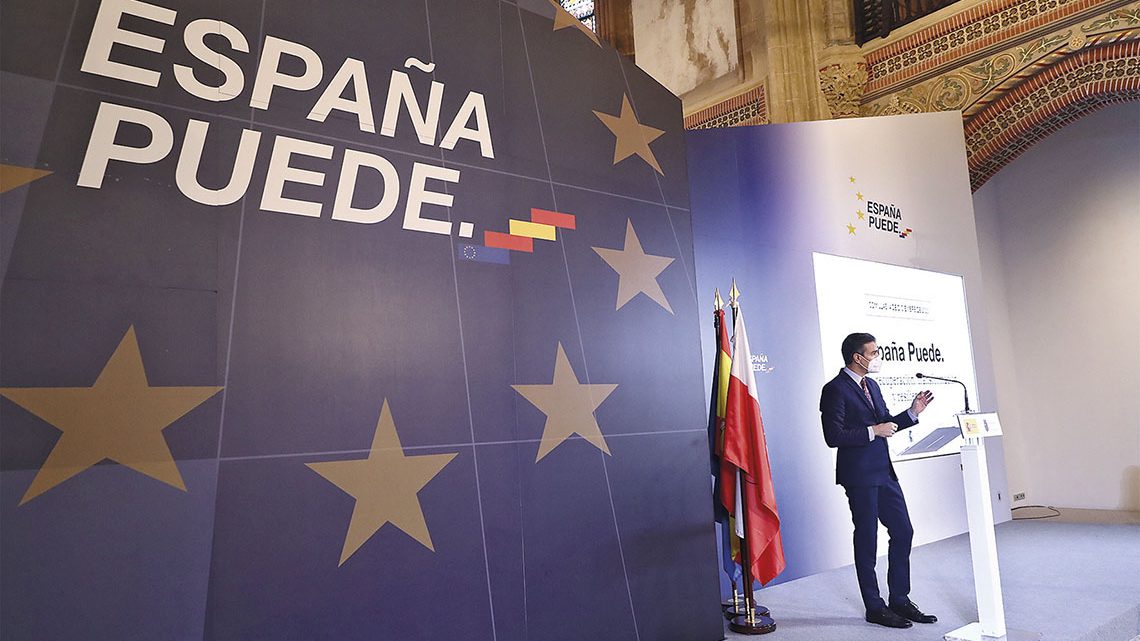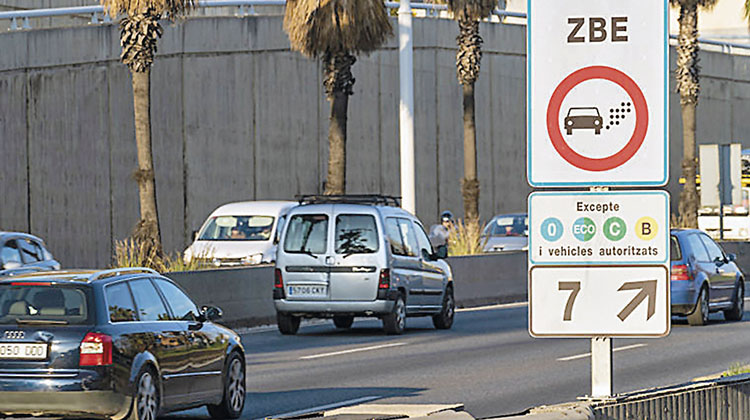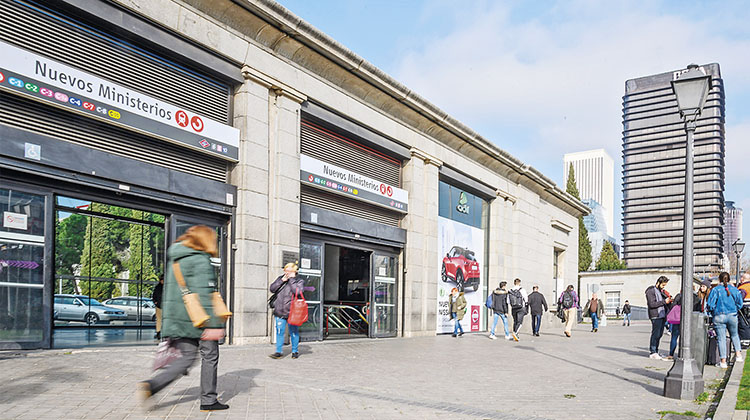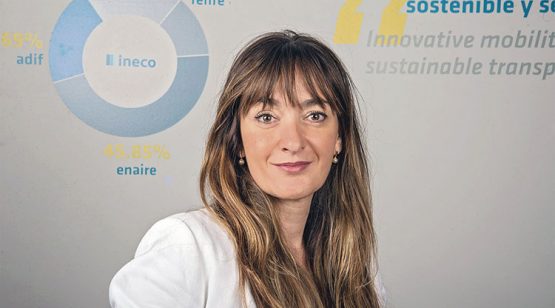The Recovery, Transformation and Resilience Plan, ‘Spain Can’, will guide the implementation of 140 billion of European funds through 2026, thanks to the Next Generation EU, recovery instrument, of which, approximately 80 billion will be spent in the form of transfers and the rest through loans.
The effort to mobilise the nearly 80 billion euros in transfers will be concentrated in the first three years (2021-2023), maximising their impact on the rapid reconstruction of the economy, before using the loans to supplement the financing of ongoing projects.
The ultimate goal of the Plan is to contribute to repairing the economic and social damage caused by the coronavirus pandemic through calls for proposals, public-private partnership projects and direct investments governed by European guidelines.
The Plan is structured around 4 guidelines, 30 components and 10 urgent lever policies: the urban and rural agenda and the fight against depopulation; resilient infrastructures and ecosystems; fair and inclusive energy transition; Administration for the 21st century; modernisation and digitalisation of the industrial fabric and SMEs; recovery of tourism and promotion of an Entrepreneurial Spain; a pact for science and innovation; reinforcement of the capacity of the National Health System; education; new care economy and employment policies; promotion of the culture and sports industry; and modernisation of the tax system.
According to the Spanish government, the mobilisation of such a large volume of resources opens up an extraordinary opportunity for the country. It will not only allow us to overcome the crisis and recover jobs, but will also facilitate the modernisation of our economy, enabling a green, digital, inclusive and social recovery.
The Plan is inspired by the 2030 Agenda and the UN Sustainable Development Goals, representing an opportunity for the Spanish Government not only to overcome the crisis and recover employment, but also to modernise the economy
Next Generation EU, an unprecedented innovation effort
The Next Generation EU funds are the response to the COVID-19 crisis, which has been a challenge of historic proportions for Europe. The EU and its Member States have had to take emergency measures to protect the health of citizens and prevent the collapse of the economy. This has required an unprecedented effort and an innovative approach that will drive the alignment, resilience and transformation in the European Union.
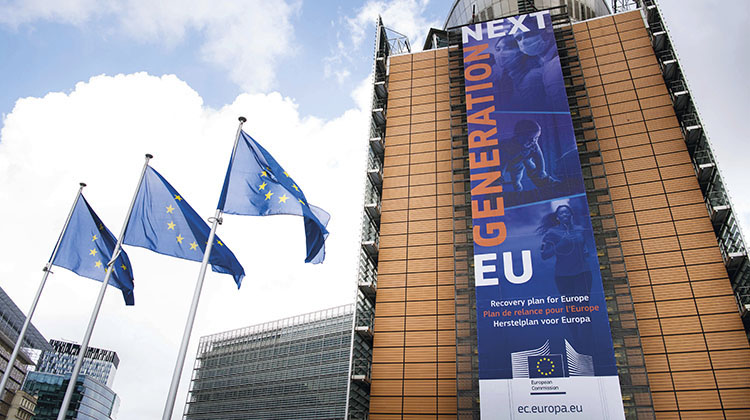
On 21 July 2020, the European Council agreed on a temporary exceptional recovery instrument known as Next Generation EU for the amount of 750 billion euros. The Recovery Fund ensures a coordinated European response with Member States in order to address the economic and social consequences of the pandemic. The funds can be used to grant repayable loans and non-repayable transfers. These amounts will be spent over six years, until the end of 2026. The portion corresponding to repayable loans must be repaid by 31 December 2058.
Challenges for the Ministry of Transport
The Plan contains actions in the areas of transport, mobility and the urban agenda for the period 2020-2023, including direct implementation actions and aid programmes.
The MITMA is expected to manage three specific components of the Plan related to transport, mobility and the urban agenda:
- Component 1: Shock plan for sustainable, safe and connected mobility in urban and metropolitan environments..
- Component 2: Implementation of the Spanish Urban Agenda with the Urban Rehabilitation and Regeneration Plan.
- Component 6: Sustainable, safe and connected mobility.
To guarantee the effectiveness of the Plan and ensure efficiency in the development of the different projects, last February the MITMA launched the first calls for expressions of interest in order to achieve a more detailed definition of its components, through the knowledge of the real interest of the market in the proposed measures and the incorporation of the needs of the sector with a high impact on the ecological and digital transformation, efficiency and economy. In the words of government Minister José Luis Ábalos, “we must take advantage of the momentum of the recovery and European funds to face the challenges of digitalisation and sustainability in mobility, housing, building and infrastructures in the coming years and modernise our productive fabric”.
Ábalos has stated that within these programmes, autonomous communities, local entities and companies will be involved, through lines of aid for issues within their jurisdiction, such as housing, town planning and transport.



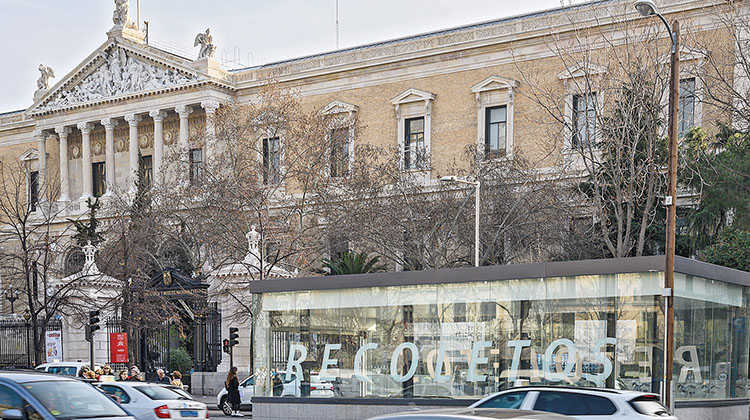
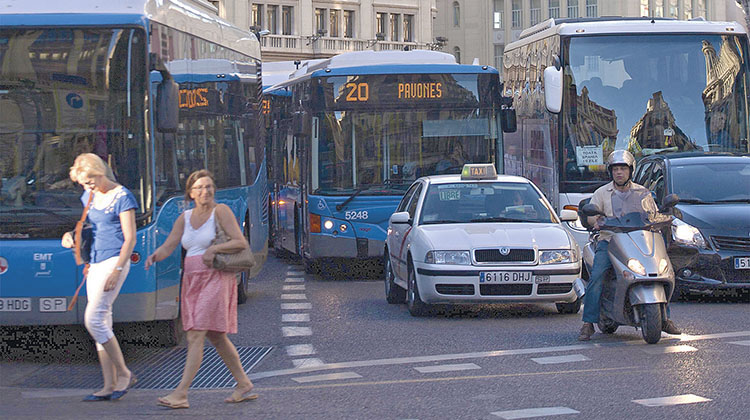
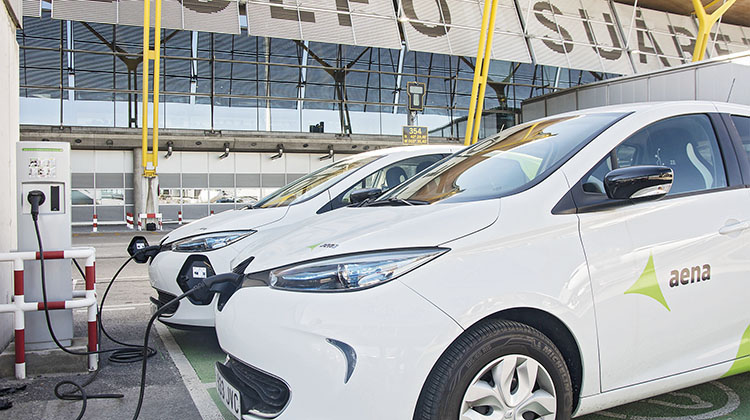
Accordingly, in the transport and mobility components, the Plan seeks to accelerate the implementation of low-emission zones in municipalities with more than 50,000 inhabitants or provincial capitals; to promote the transformation of transport towards zero emissions; to reduce the use of private vehicles in urban and metropolitan areas, prioritising collective public transport and active mobility, thus contributing to the objectives of modal shift and, finally, to promote the digitalisation of the activity of public transport services. A sustainable and digital transport support programme for businesses will also be launched.
In terms of housing, the minister announced the renovation of homes in metropolitan and rural areas during the Plan period, as well as the promotion of the renovation of public buildings and the local action plans of the Spanish Urban Agenda.
The aim of all this work is to finance projects that will enable a rebalancing of the modal split of national transport towards more sustainable modes, reduce the sector’s high share of pollutant emissions and make use of available digital and technological advances. According to the National Greenhouse Gas Inventory, in 2018 transport was responsible for 27% of total greenhouse gas emissions in Spain, making it necessary to promote multimodal transport that contributes to reducing environmental impacts. Another cornerstone to work on is improving the competitiveness of Spanish companies through advances in digitalisation, artificial intelligence, big data and e-commerce.
A big opportunity for the Infrastructure, Transport and Housing sector
The Recovery Plan is vitally important for the infrastructure, transport and housing sector. It is a lever that will enable the challenges of digitalisation and the sustainability of mobility, housing, building and infrastructures to be addressed in the coming years, modernising Spain’s productive fabric. To this end, it is vital to ensure effective implementation measures in order to facilitate the achievement of the Plan’s objectives. For this purpose, MITMA has created a Technical Support Office for the Plan in which Ineco collaborates by providing expert advisory services.
The Office has a multidisciplinary team of professionals who will advise and oversee the management, monitoring and coordination of the development of the programme and will provide the means needed to carry out the management of the grants, optimising them as much as possible.
The MITMA has created a Support Office for the Recovery Plan, comprising a multidisciplinary team of experts who will advise and oversee the management, monitoring and coordination of the development of the programme
In this regard, Minister Ábalos highlighted the steps already taken towards “streamlining public procurement and management, in accordance with European law and the unwavering commitment in the fight against corruption”. Furthermore, he pointed out that “we are counting on the autonomous communities and local city councils. We envisage the co-management of European funds, consistent with the aims of the Plan”.
The Technical Support Office, through the MITMA, will provide support in the coordination, integration of all information, management of competitive calls for grants, monitoring and control of direct management grants, document management and communication with the outside world, including the Office of the President of the Government of Spain and/or EU authorities, among others. Specialists from a variety of disciplines, mainly engineers, architects, economists and lawyers, as well as administrative staff, will be involved in the different areas of development. Its role includes supporting the Secretariats-General of the MITMA in the areas of transport and mobility, infrastructure, urban agenda and housing.
josé luis ábalos
Minister of Transport, Mobility and Urban Agenda (MITMA)
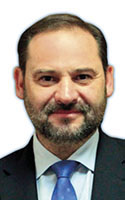
The Recovery, Transformation and Resilience Plan ‘Spain Can’ is the result of hard work and intense dialogue and cooperation, inside and outside the government. Most importantly, however, it is the product of a clear mission to face the challenges of mobility, infrastructures and urban actions of the next decade, and to lead the way forward.
The three components of the Plan in which we are involved as a Ministry are crucial for the rapid recovery of our economy and for the real transformation that Spain needs. We are responsible for directly or indirectly managing more than 20% of European aid, as well as its impact on key sectors such as engineering, construction and transport, which together account for more than 20% of GDP.
The Plan makes it possible for the Ministry and MITMA Group companies to activate their capacity to invest remarkably quickly, and so we will make a significant contribution to containing the impact of the pandemic on GDP and employment, which is of vital importance at this time. However, we cannot be content with deploying counter-cyclical muscle; we must make an effective contribution towards decarbonising and digitalising economic activity, promoting increased social and territorial cohesion and equality in our country.
There is so much we can do by moving towards lower-emission, more modern, socially and technically modern mobility and logistics, as well as friendlier and more sustainable housing, buildings and neighbourhoods. Fortunately, in the Ministry and in the sector as a whole, we have been preparing ourselves for years, so the prospect of success is a realistic one if we believe in our own capabilities.
Of course, this is not just a challenge for the government. We in the Ministry take responsibility for providing the funds for the transformative approach that our country and our times demand. But it is up to all of us, professionals, the private sector, the academic sector and public administrations as a whole, to seize this opportunity for the future of Spain. I am convinced that we will succeed.
Lever policies led by MITMA
Of the ten leverage policies that make up the National Recovery, Transformation and Resilience Plan of the government of Spain, MITMA leads policy I. Urban and Rural Agenda. Territorial Cohesion, and II. Infrastructure and Resilient Ecosystems.
I. Urban and Rural Agenda. Territorial cohesion. Within section, the actions promoted by MITMA include:
- Low Emission Zones.
- Transformation of urban and metropolitan transport.
- Improvement of the quality and reliability of the Cercanías network.
- Energy and comprehensive rehabilitation of public and private buildings.
- Programmes for the regeneration of neighbourhoods and construction of subsidised housing.
II. Infrastructure and Resilient Ecosystems.
Within the framework of Lever II, MITMA will give a decisive boost to:
- European corridors and the rest of the projects included in the Trans-European Transport Network.
- Promote intermodality and logistics.
- Support program for sustainable and digital transport, mainly of goods, aimed at the private sector.


